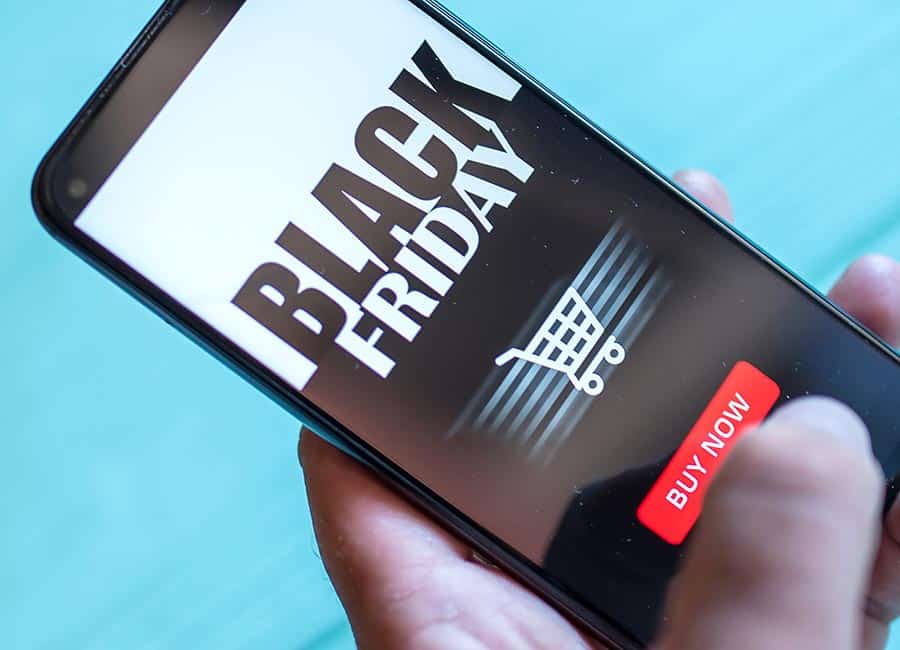Nearly two-thirds (64%) of Irish consumers will likely go bargain hunting over the Black Friday/Cyber Monday sales period and purchase at least one item, research from PwC shows.
On average, consumers plans to spend €329, more than all other European countries surveyed and over €50 more than the European average.
A fifth (20%) of Irish shoppers will spend at least €500 or more during the sales period compared to 14% of European respondents.
Traditionally a post-Thanksgiving sales day in the US, Black Friday is now firmly established in Ireland with spending set to increase this year.
Some 36% of Irish consumers said that they are planning to spend more compared to last year’s Black Friday/Cyber Monday period, ahead of European counterparts (30%).
Key reasons for this include higher prices as well as being hopeful of getting good deals. At the same time nearly half (46%) will spend the same (48% in Europe) and 18% will spend less compared to last year (22%).
rish consumers cite the key reasons for spending less is having less money to spend while being cautious about their spending, reducing the number of things they own and not believing that they will get a genuine deal.
A fifth of both Irish (20%) and European (19%) consumers intend to rely on a ‘Buy now, pay later’ service to finance their Black Friday/Cyber Monday purchases.
Around 56% will plan their purchases before or during the week of Black Friday and 25% will not plan ahead.
PwC questioned 2,000 Irish consumers by age and gender as well as respondents in five other European countries for the study.
The research was intended to establish shopping trends during the Black Friday/Cyber Monday period including how much is spent, online vs bricks-and-mortar and sustainable shopping.
“Black Friday/Cyber Monday remains an attractive shopping event that has become an integral part of the Irish consumer landscape," said Jack O'Loughlin, lead of PwC Ireland's retail and consumer practice.
"Many Irish consumers will look to avail of good deals and do a large part of their Christmas shopping during this shopping period.
"Understanding how Irish shoppers engage with both the store and online creates the opportunity for retailers to shape product and promotional strategies in a way that will resonate across this Black Friday weekend.”
The study also showed that half (52%) of Irish consumers are of the view that a bargain means a price reduction of between 25% and 50%, and 22% believe it is a discount of around 50%.
Irish consumers get more frustrated when shopping over the Black Friday period than their European counterparts on a number of issues.
Approximately 22% of Irish consumers said that they are unhappy about excessive queues, stock running out and stores being too busy compared to 19% in Europe.
A fifth (20%) are not confident that they will get a genuine deal, and 14% say that there is too much advertising in the lead up to Black Friday/Cyber Monday.
Over one in ten (13%) are frustrated by longer delivery times than expected, more than European counterparts (11%).
Some 51% of Irish consumers expect to purchase at least half of their Christmas presents during the Black Friday/Cyber Monday period, and 72% will use it to shop for family.
When it comes to Christmas shopping, over a third (35%) will buy more items with the same budget, and more Irish (25%) than European (21%) consumers reported that they tend to spend more on Christmas gifts than they had initially planned during the Black Friday period.
Three-quarters (77%) of Irish consumers said that it is important that they can shop both online and in bricks-and-mortar stores during the Black Friday/Cyber Monday period.
At the same time, over half (52%) of Irish consumers’ Black Friday budget is invested in online purchases that are delivered to their home while 37% of spending will be done in store.
A further three in 10 (30%) said that they shop more online now than before the pandemic, but 38% will only buy products they need as people become more conscious about their consumption.
Some 28% will try to avoid impulse buying, and almost one in five (19%) said that they will avoid ‘fast fashion, while 30% will try to avoid returns.
Over half (53%) of Irish consumers reported that last year they had a product or a list of products that they were intending to or interested in buying.
On the other hand, a third (34%) admitted that they purchased on impulse during the black Friday period last year.
Around 41% of Irish consumers expect to spend the majority of their Black Friday budget on electronics or technology items, and significant proportions of respondents will spend on clothes, shoes and accessories (35%) or health and beauty (23%).
"While consumers are more likely to purchase online over the Black Friday weekend, the importance of an omnichannel approach remains, with a significant number of consumers still preferring in-store shopping," said Owen McFeely, director of PwC Ireland's retail and consumer practice.
"These in-store shoppers create a real opportunity for retailers to deliver excellent in-store service, build trust and deepen their relationships with these shoppers.”

“The survey also highlights that consumers have become more demanding. Customer service, product availability and strong promotional value are key to winning the hearts and minds of Irish shoppers.
"Retailers who understand the customer purchasing journey and allow the shopper to engage seamlessly across both online and in-store shopping channels will be the winners in 2024.”
(Pic: Artur Widak/NurPhoto via Getty Images)









